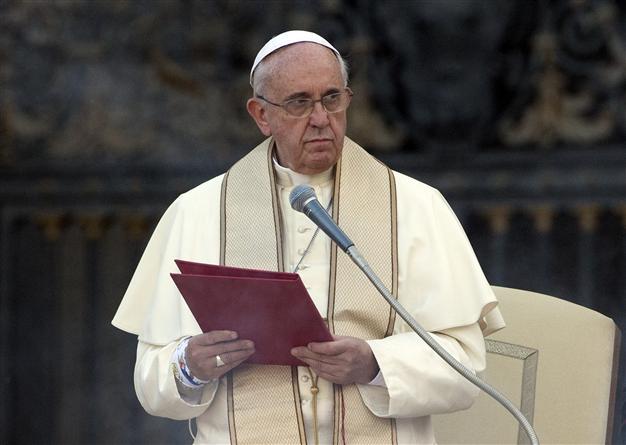* Holy Year to last from Dec. 8-Nov. 26
* Pope describes abortion as “existential and moral ordeal”
* In Church teachings, abortion is grave sin (Adds comment by British anti-abortion group)
By Isla Binnie and Philip Pullella
Pope Francis will give all priests discretion during the Roman Catholic Church’s Holy Year to formally forgive women who have had abortions — the Argentine pontiff’s latest move towards a more open and inclusive church.
In Church teaching, abortion is such a grave sin that those who procure or perform it incur an automatic excommunication, which can only be lifted by designated church officials.
However, from Dec. 8 to Nov. 26, during an extraordinary Holy Year or “Jubilee” on the theme of mercy, all priests will be able to do so if the women repent “with a contrite heart”, the pope said in a letter published by the Vatican on Tuesday.
Francis described the “existential and moral ordeal” faced by women who have terminated pregnancies and said he had “met so many women who bear in their heart the scar of this agonising and painful decision”.
The pope’s letter did not mention those who perform abortions.
Francis is the first non-European pope in 1,300 years and has marked himself out for tolerance on taboo topics. Although he has shown no intention of retracting the Church’s opposition to abortion, he has alarmed conservatives by taking a less forceful tone than his predecessors.
“This is by no means an attempt to minimise the gravity of this sin, but to widen the possibility of showing mercy,” Vatican chief spokesman Father Federico Lombardi told reporters.
Deputy Vatican spokesman Father Ciro Benedettini said that “for now” the change would apply only during the Holy Year.
Usually only a bishop, missionary or the chief confessor of a diocese can offer absolution for an abortion, Benedettini said, although bishops in countries such as the United States and Britain have delegated this authority to parish priests.
Boston College theology professor James Bretzke said the pope was “emphasising mercy and not retribution … embracing reconciliation and not excommunication”.
Liberal group Catholics for Choice welcomed the move as a gesture of engagement with women.
“This is a pope who is not stuck in the pelvic zone, and perhaps his message on how he thinks about abortion is more for his brother bishops than Catholics in the pew,” said the group’s president, Jon O’Brien.
But anti-abortion campaigners said they feared the pope’s letter could be misconstrued.
“We would be concerned that a too widespread permission could be misinterpreted as the Church softening its teaching on abortion that it is the taking of the life of an innocent human being,” said John Smeaton, chief executive of Britain’s Society for the Protection of Unborn Children.
Smeaton said it was very important that a meeting of bishops at the Vatican next month on the family should leave “no ambiguity about the Church’s teaching on the sanctity of human life and the evil of abortion.”
INDULGENCES
The pope is due this month to visit the United States, where his gesture to women who have terminated pregnancies took on a political dimension given the fierce opposition to abortion within the Republican Party.
Republican presidential candidate Jeb Bush, who is Catholic, told Fox News the pope’s decision was “extraordinary”.
“I hope that we also focus on mercy for the unborn, the hundreds of thousands of babies that will die,” the former Florida governor said.
The Roman Catholic Holy Year is one of the 1.2 billion-member church’s most important events, and sees the faithful make pilgrimages to Rome and other religious sites. It takes place every 25 years unless a pope decrees an extraordinary one to bring attention to a particular topic or need.
Catholics performing pilgrimages or good works during the Holy Year can traditionally gain indulgences, or the remission of punishment for sins, under certain conditions.
Unlike in previous holy years, when pilgrims had to come to Rome, cathedrals and other religious venues around the world are expected to be designated national pilgrimage sites.
In his letter, the pope also said indulgences would be available to prisoners, who, because they are incarcerated, cannot pass through the Holy Doors of the papal basilicas in Rome. The Holy Doors, which symbolise the doorway of salvation for Catholics, are only opened during Jubilee Years and pilgrims passing through them secure the remission of their sins.
Of prisoners, Francis said: “May the gesture of directing their thought and prayer to the Father each time they cross the threshold of their cell signify for them their passage through the Holy Door.”
Holy Year activities will also be open to adherents of the ultra-traditionalist Roman Catholic splinter group known as the Society of Saint Pius X (SSPX).
The Swiss-based SSPX, which rejects some of the reforms made at the historic 1962-1965 Second Vatican Council, defied Rome in 1988 by illegally consecrating four bishops, triggering their excommunication by the late Pope John Paul.
Pope Benedict lifted the excommunications in 2009 and made some concessions to the group. But one of the bishops, British-born Bishop Richard Williamson, caused an uproar by denying the Holocaust. (Additional reporting by Mohammad Zargham in Washington; Editing by Crispian Balmer and Alison Williams)



